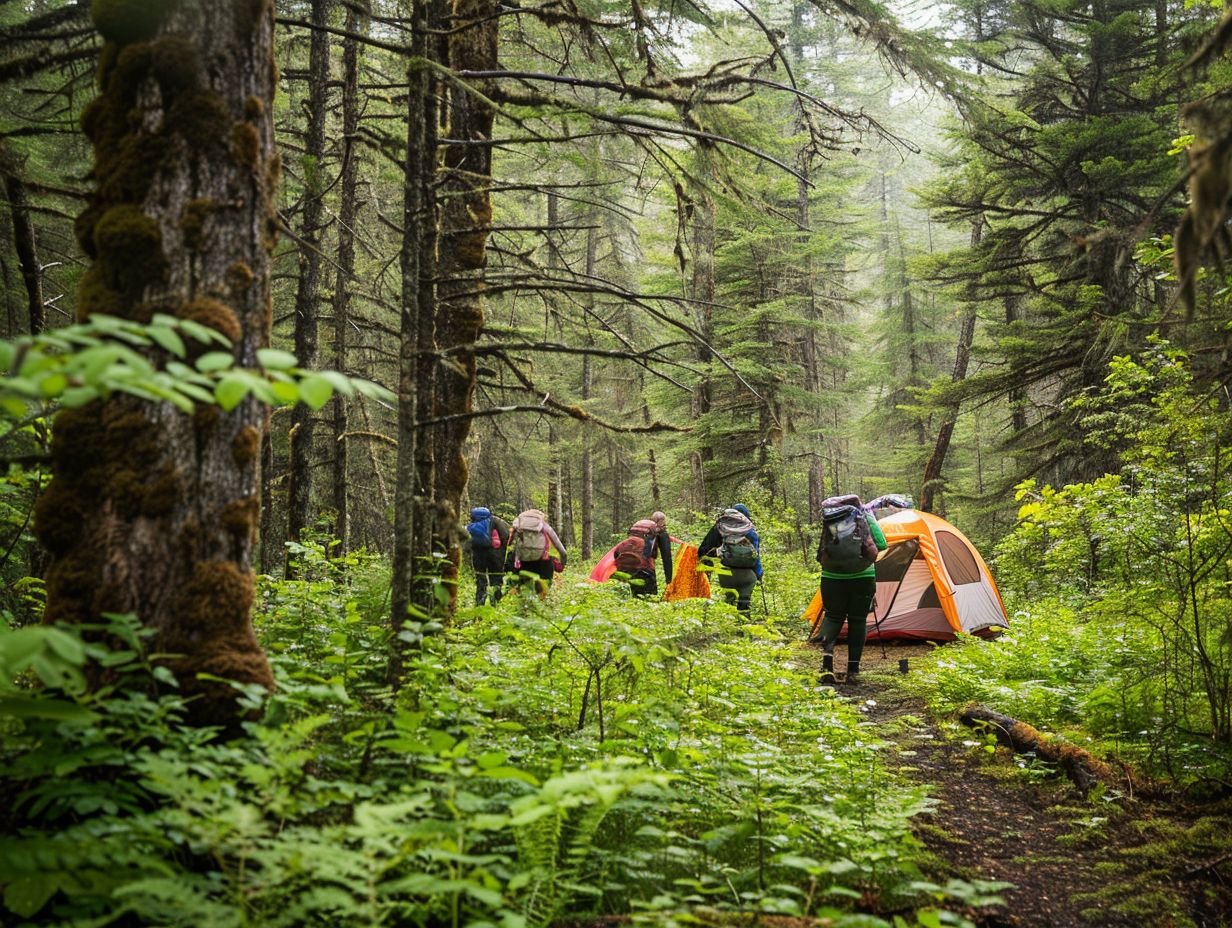If you are looking to enjoy the great outdoors while reducing your carbon footprint, the benefits of choosing a zero-carbon camping trip for both the environment and your personal experience will be explored.
From planning your trip and selecting eco-friendly supplies to engaging in zero-carbon activities and minimising waste, all the tips and tricks you need for a sustainable outdoor adventure will be provided.
Join us as we discuss eco-friendly campfire alternatives, transportation options, and much more.
Key Takeaways:

- Choose a zero-carbon camping trip to reduce your environmental impact and enhance your personal experience with nature.
- Plan your trip by selecting an eco-friendly location, bringing sustainable supplies, and engaging in zero-carbon activities like hiking and wildlife watching.
- Minimise waste and impact by practicing Leave No Trace principles, using eco-friendly campfire alternatives, and utilising green transportation methods to reach your destination.
Why Choose a Zero-Carbon Camping Trip?
Embarking on a zero-carbon camping trip not only allows you to immerse yourself in the picturesque landscapes of the UK, such as the stunning National Parks like the Lake District and Snowdonia, but it also promotes sustainable and eco-friendly practices that significantly reduce your carbon footprint.
Choosing to engage in a zero-carbon camping excursion is a remarkable way for you to directly contribute to environmental conservation efforts. By opting for eco-friendly camping practices, you are actively participating in the preservation of natural ecosystems, wildlife habitats, and biodiversity.
Selecting UK destinations renowned for their sustainability initiatives ensures that your travel aligns with responsible tourism standards. Supporting establishments certified by the Green Tourism Business Scheme guarantees that your stay is eco-conscious and helps in minimising the impact of your adventure on the environment.
The advocacy of prominent eco-campaigners like Greta Thunberg further emphasises the importance of making sustainable choices while exploring the great outdoors.
Benefits for the Environment and Personal Experience
Opting for a zero-carbon camping trip allows you to contribute to environmental preservation through sustainable habits and practices. You will stay in eco-friendly accommodations equipped with solar panels and wind turbines, ensuring a carbon-neutral travel experience.
Utilising renewable energy sources like solar panels and wind turbines will help minimise the carbon footprint of your camping adventure and reduce reliance on fossil fuels.
Additionally, incorporating sustainable gear made from recycled materials and implementing waste management strategies such as composting and rainwater harvesting will further enhance the positive impact on the environment.
Embracing carbon offsets can offset any residual emissions, providing a more sustainable approach to outdoor exploration and underscoring the importance of environmental stewardship in sustainable tourism.
Planning for a Zero-Carbon Camping Trip
Effective planning for a zero-carbon camping trip involves meticulous selection of sustainable gear, accommodations with renewable energy sources like solar panels and wind turbines, and implementing waste management practices such as composting and rainwater harvesting.
Incorporating the use of eco-friendly toiletries, reusable containers, and solar-powered gadgets can further reduce your environmental footprint.
Choosing campsites that prioritise conservation efforts and support local communities is another important aspect of planning a zero-carbon trip.
Offsetting any unavoidable carbon emissions through reputable carbon offset programmes plays a crucial role in achieving carbon-neutral travel experiences. By being mindful of these various elements, you can enjoy the great outdoors while minimising your impact on the environment.
Choosing a Location and Supplies
When selecting a location for your zero-carbon camping trip, consider sites endorsed by the Green Tourism Business Scheme, such as the picturesque Lake District.
Opting for eco-friendly locations like the Lake District not only helps reduce your carbon footprint but also supports the preservation of natural habitats and biodiversity. Organisations like The Greener Camping Club provide sustainable camping options to promote responsible tourism and conservation efforts.
Utilising public transport to reach your camping destination can further enhance your eco-conscious journey by decreasing emissions and traffic congestion. Embracing green transportation aligns with the principles of sustainable travel, fostering a deeper connection with the environment while minimising negative effects on the planet.
Zero-Carbon Activities for Your Trip

Engaging in zero-carbon activities during your camping trip involves adopting sustainable habits, utilising eco-friendly gear, and exploring nature while minimising your environmental impact through carbon-neutral travel practices.
This includes choosing accommodations that prioritise eco-friendly practices such as composting toilets, solar-powered showers, and recycled materials. Opting for renewable energy sources like solar panels or portable wind turbines can power your campsite without relying on fossil fuels.
Utilising biodegradable camping gear, reusable containers, and investing in carbon offset programmes for any unavoidable emissions can further enhance your sustainable camping experience.
Waste management is crucial, so make sure to minimise single-use plastics, practise responsible waste disposal, and leave no trace to preserve the natural beauty of your surroundings.
Exploring Nature Without Leaving a Carbon Footprint
Immerse yourself in the beauty of nature while ensuring a minimal carbon footprint by practising sustainable habits, responsible waste disposal, and supporting the conservation efforts of National Parks like the serene Lake District.
Opt for eco-friendly camping gear made from recycled materials or sustainable sources to significantly reduce the environmental impact of your trip. Consider using biodegradable toiletries to minimise pollution in water bodies and choose reusable items to lower waste production.
Embrace the Leave No Trace principles to preserve the pristine landscapes, respect wildlife habitats, and keep campsites clean. Engage in carbon offset programmes to help neutralise the emissions generated during travel, contributing to the protection of the natural environment in places like the Lake District.
Minimising Waste and Impact
Minimise waste and environmental impact on your zero-carbon camping trip by adopting sustainable habits, making eco-friendly choices, and implementing proper waste disposal and recycling methods to preserve the natural beauty of National Parks like the enchanting Lake District.
Choose reusable camping gear such as water bottles, utensils, and food containers to significantly reduce single-use plastic waste during your outdoor adventures. Opt for biodegradable toiletries and packaging materials to lessen the impact on the environment.
When exploring the serene landscapes of destinations like the Lake District, remember to leave no trace by packing out all rubbish and debris, ensuring that the pristine surroundings remain undisturbed for future visitors to enjoy.
Support local conservation efforts and respect wildlife habitats as key components of promoting responsible outdoor practices in these iconic natural areas.
Eco-Friendly Campfire Alternatives
When exploring eco-friendly campfire alternatives during your camping trip, you should opt for sustainable practices, alternative cooking methods, and energy-efficient options. These choices not only help reduce environmental impact but also align with proper campfire etiquette.
When selecting alternative cooking methods, it is advisable to consider using portable solar cookers or efficient camping stoves that operate on renewable energy sources. These options offer a sustainable way to prepare meals without relying on traditional wood fires.
Investing in energy-efficient camping lanterns or LED lights can provide illumination at your campsite while minimising energy consumption.
Proper campfire etiquette, such as using only designated fire rings and ensuring the fire is fully extinguished before departure, plays a vital role in safeguarding the environment and preserving natural habitats for future generations.
Alternative Ways to Cook and Stay Warm

When planning your camping trip, consider exploring alternative methods to cook and keep warm that are sustainable and environmentally friendly. Utilise energy-efficient stoves, integrate solar panels and wind turbines for energy requirements, and wear insulated clothing to minimise your impact on the environment.
Opting for energy-efficient stoves not only decreases fuel consumption but also helps in reducing greenhouse gas emissions.
Solar panels and wind turbines provide renewable energy sources, enabling you to power your devices in an environmentally conscious manner. Insulated clothing aids in retaining body heat, reducing the necessity for excessive heating methods.
By embracing these eco-friendly practices, you not only promote a zero-carbon camping experience but also strengthen your connection with nature by making responsible gear choices.
Transportation Options for a Zero-Carbon Camping Trip
When exploring transport options for your zero-carbon camping trip, it is important to consider choosing sustainable modes such as public transport. This aligns with the eco-friendly ethos promoted by initiatives like the Green Tourism Business Scheme, which is supported by renowned eco-campaigners.
Opting for public transport not only reduces your carbon footprint but also contributes to minimising traffic congestion and air pollution in popular camping areas.
By embracing eco-friendly transport methods, you play a vital role in preserving the natural beauty of your surroundings and supporting the sustainability goals set forth by organisations like the Green Tourism Business Scheme.
The efforts of eco-campaigners have been instrumental in raising awareness about the benefits of green travel and advocating for policy changes that incentivise eco-conscious choices among travellers.
Green Transportation Methods to Reach Your Destination
Opt for green transport methods to reach your camping destination, reducing your carbon footprint, promoting sustainable tourism practices, and emphasising eco-friendly choices that support renewable energy sources, carbon offsets, and responsible waste management.
Consider using bicycles or electric vehicles for short distances, minimising emissions and immersing yourself in the natural surroundings.
Look into car-sharing with fellow campers to share rides and reduce the number of vehicles on the road.
When planning your trip, opt for public transport or trains whenever possible to decrease the overall carbon impact of your travel.
You can even explore innovative options like hydrogen fuel cell vehicles or solar-powered transport to further contribute to a zero-carbon camping experience.
Frequently Asked Questions
How can I plan a zero-carbon camping trip?
To plan a zero-carbon camping trip, you should start by choosing an eco-friendly destination. Look for campsites that have sustainable practices, such as using renewable energy or recycling. You should also consider packing light and bringing reusable items, such as water bottles and utensils. Additionally, plan your transportation carefully and opt for low-emission modes of travel.
What should I consider when choosing a destination for a zero-carbon camping trip?

When choosing a destination for a zero-carbon camping trip, look for campsites that have eco-friendly practices in place. This could include using renewable energy sources, implementing recycling programs, and supporting local conservation efforts. You should also consider the location’s accessibility and whether it offers activities that align with your zero-carbon goals, such as hiking or kayaking.
How can I reduce my carbon footprint while camping?
To reduce your carbon footprint while camping, you can start by packing light and bringing reusable items. Instead of using disposable plates and cutlery, opt for durable, washable options.
You should also be mindful of your energy usage by turning off lights and electronics when not in use. Additionally, choose eco-friendly transportation options, such as biking or carpooling, to get to your campsite.
What are some eco-friendly camping gear options?
There are many eco-friendly camping gear options available, such as solar-powered chargers, biodegradable toiletries, and reusable water bottles. You can also find sustainable camping gear made from recycled materials or natural fibers, such as bamboo or hemp. It’s also a good idea to invest in high-quality, durable gear that will last for multiple trips, reducing the need for replacement items.
How can I involve others in my zero-carbon camping trip?
To involve others in your zero-carbon camping trip, you can spread awareness about the importance of sustainable travel and encourage others to make eco-friendly choices. You can also plan group camping trips and incorporate activities like a beach clean-up or nature hike to educate and involve others in conservation efforts.
Additionally, you can share tips and resources on how to plan a zero-carbon camping trip with friends and family.
What are some benefits of planning a zero-carbon camping trip?
Planning a zero-carbon camping trip has numerous benefits for both the environment and your personal experience. By reducing your carbon footprint, you are helping to preserve natural resources and protect wildlife.
Additionally, camping in a sustainable manner can lead to a more immersive and authentic outdoor experience. You may also save money on gas and other travel costs, as well as learn new skills for sustainable living.



